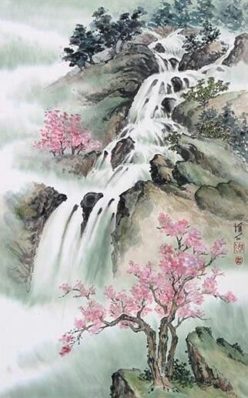
Xu Zhangrun (許章潤, b. 1962),who taught jurisprudence and constitutional law at Tsinghua University (until he was suspended March of 2019), in the summer of 2018 published an extensive critique of recent political trends in China. While not actually mentioning Xi Jinping by name, Xu rakes the general secretary over the coals, tearing down Xu’s program, mocking the “China Dream,” and targeting especially the elimination of “term limits” for the head of state. In the decades prior to the 19th Party Congress in 2018, the constitution limited the head of state (State Chairman, nowadays usually translated “President”) to two terms of five years each. This was removed in the spring of 2019. China’s head of state is pretty much a ceremonial office (the control of government operations is vested in the Premier of the State Council, and the real boss of the regime is the General Secretary of the Communist party, a position Xi Jinping holds as well as his State Chairmanship). The elimination of this term limit is, then, symbolic: it indicates Xi’s intention to remain as top boss indefinitely, perhaps for the rest of his life. Xu takes this as indicative of the end of the reform movement that began shortly after the death of Mao Zedong in 1976, a sign that China is moving backwards toward a Stalinist-Maoist totalitarian system.
In addition to the elimination of term limits, Xu complains of the lack of any progress toward political reform over the four decades since the onset of reform (he says that the term limitation was really the only tangible move toward political reform, and its main benefit was to assure people that no matter how bad things continued to be, at least after five or ten years there would be a different tyrant in charge. The regime, he fears, is abandoning economic development as its main policy direction in favor of increased political control. He claims that this ongoing improvement of living standards is the main reason the population has been willing to put up with the regime, and that if life does not continue to improve there will be rebellion. He denounces the promiscuous spending on foreign aid (probably with the One Belt-One Road, a pet project of Xi Jinping’s, in mind): this wastes the wealth the people have built up with their blood and sweat, not for any real national advantage but merely for political glory.
Xu cites “ordinary people” in support of the criticisms he makes, although his position is that typically found among the liberal intellectual elite. This includes the condescension that crowd tends to take toward ordinary people: For example, the ordinary people will be happy with any political system as long as it lets them live their lives in peace with a modicum of comfort and security (although, on reflection, maybe this is the best any of us can shoot for). He condemns the increasing suppression of free thought, especially for intellectuals—since all progress depends upon that “elite’s” ability to think freely. He is an enthusiast for globalization and the free market, and may not take seriously enough the problems those concepts bring in practice: corruption; the collusion between favored economic elites and the dominant political elites (something he, too, explicitly deplores); the damage these abstractions have often wrought upon farmers and blue-collar workers (the “ordinary people” he champions). He does not consider that while Xi Jinping’s line may mark an intensification of tyranny, the dominance of a self-selected oligarchy, and a violation of human liberty and the repression of the human spirit, it is not purely unmotivated malice: there are objective causes for the line’s being what it is–including an attempt, however misguided, self-serving, and in the long run self-defeating, to break the power of a corrupt elite fattening itself on the rents of a still heavily-politicized market economy.
Xu, interestingly, seems to think that the Trump and Xi regimes are reflections of each other. But while Xi’s rule, arguably (and there is much here to be argued about) is in part a revival of the Red Guard spirit of the 1960s, it is far-fetched to see Trump’s rule as a revival of the 1960s counterculture, as Xu seems to believe: that, more aptly, would have been Obama, with Trump representing the “backlash” against that counterculture. Also, in the Xi-Trump era, America and China have in a sense changed sides. Trump’s policy, for all his bluster about American military prowess, seems aimed at a stand-down from world leadership, with a preference for bilateral over multilateral relations; whereas Xi has become, for the time being, at least verbally, a champion of multilateralism. And global hegemony may without too much of a stretch be considered as an aim of Xi’s “China Dream.”
Xu’s writes in a difficult style, mixing colloquial, even vulgar, expressions with elegant literary ones. He is liberal in his use of sarcasm (advising, for example, that the regime “rehabilitate” the mass democracy movement of 1989, suppressed by military force, on the grounds that once it has been rehabilitated no one will ever think of it again, so eliminating one source of grumbling against the rulers). In places the argument does not seem to run smoothly: is this the fault of the translation? Or does Xu sometimes fall into a kind of stream-of-consciousness, his mind moving faster than his pen? I am not always sure of the accuracy of my English rendition–it may be more nearly a paraphrase than a translation.]
(For a defense of Xu and a criticism of Tsinghua for suspending him, see http://www.ftchinese.com/story/001082059?from=groupmessage&isappinstalled=0; for Xu’s own reaction to his suspension, see https://boxun.com/news/gb/pubvp/2019/03/201903271121.shtml)
